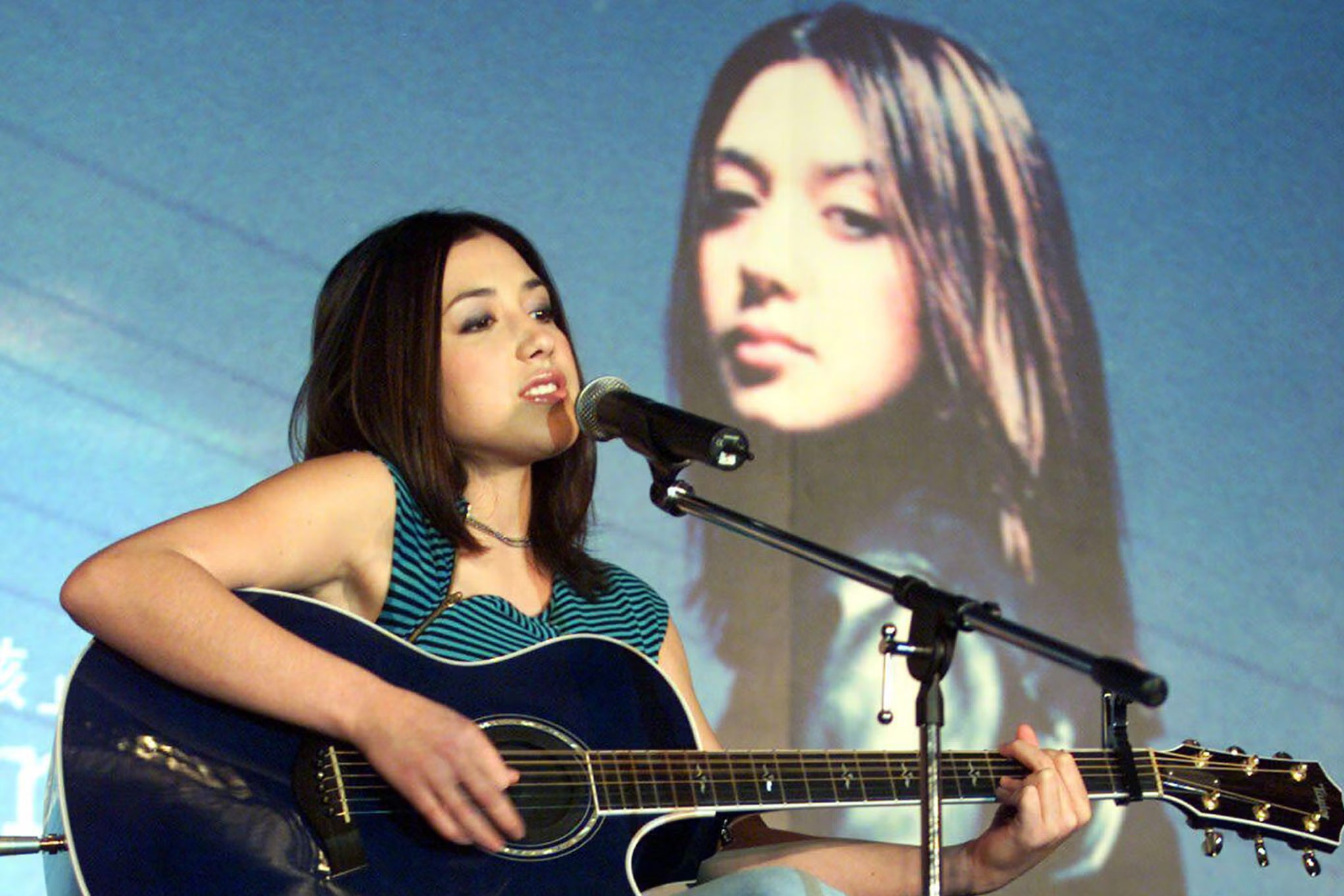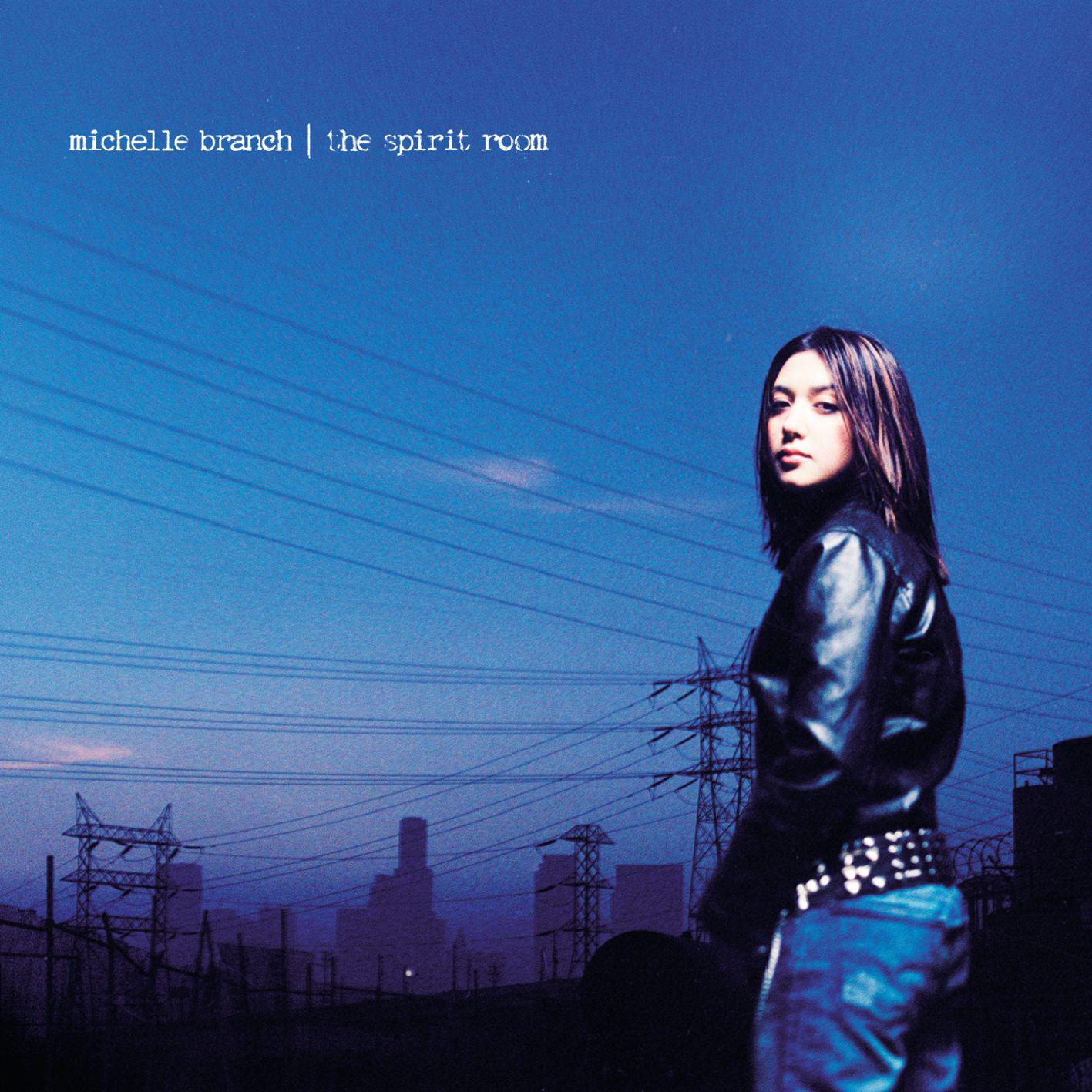Michelle Branch on The Spirit Room at 20: ‘It was allowed to remain authentically teenage’
The singer-songwriter’s debut, released when she was 18, remains a millennial classic and the blueprint for teenage pop-rock. She talks to Adam White about capturing youthful truthfulness and lighting the way for Taylor Swift


Michelle Branch was in Nashville when she had a fan encounter she’ll never forget. It was 2006, five years after the diaristic pop songs she’d written in her bedroom had become international hits, along with her debut album The Spirit Room. The fan was around 15 or 16 at the time, had curly blonde hair and a single on country radio. Her name was Taylor Swift. “No one really knew who she was,” Branch remembers. “She was out doing promo for her first song, and she and I met and she’s like, ‘Oh my god – The Spirit Room was such a huge album for me! I’m such a big fan!’ As I get older, I feel like I have those moments where I’m like: ‘Oh, I don’t feel as relevant as I once did..’. I definitely feel the passage of time. But more often than not there’s a female with a guitar who says, you know, I grew up listening to your record, and it’s always a really, really good feeling.”
Even if Branch’s music didn’t convince you to pick up an instrument yourself and become the biggest pop star in the world, it at least may have provided a mirror. Released 20 years ago today, The Spirit Room – which included beloved early 2000s singles such as “Everywhere” and “Goodbye to You” – is a teenage howl, a pop-rock classic and a heartbreak album for the far too young to ever have been heartbroken. Branch was only 16 when she began writing it and 18 by the time it hit the shelves. An adolescent jumble of bravado and vulnerability fills every track, and the album’s fingerprints can be found on a litany of guitar-heavy teen melancholia released in the decades since.
Today, Branch is 38, a mother of two, and calling London from the back porch of the Nashville home she shares with her husband, the Black Keys drummer Patrick Carney. “It feels like it was just yesterday, but then, in a lot of ways, it does feel like it’s been 20 years,” she says. “I have a daughter who just turned 16 last week and as I’ve been reflecting on The Spirit Room, it’s really been blowing my mind to look at her and know that I was basically her age when I wrote it. As an adult, I really don’t understand how that happened.”
Even now, when a viral TikTok video can turn a plucky young person into a pop sensation, Branch’s spectacular rise sounds surreal. After gigging locally aged 14, she released a self-produced CD, which led to opening for cherubic pop trio Hanson, after which Madonna’s record label, Maverick, came knocking with a contract in hand. Branch and her lyric-strewn notebooks were partnered with the veteran producer John Shanks – who had worked with everyone from Barbra Streisand to Stevie Nicks and Sheryl Crow – and The Spirit Room was recorded in just three and a half weeks. It became a blockbuster, going double platinum in the US and selling more than two million copies worldwide. Its singles – including the anthemic head rush “All You Wanted” – were inescapable.
Shanks’s production is incredibly polished and maximalist – there’s lots of reverb, whining guitars and vocal effects – but Branch’s lyrics and delivery grant everything a potent urgency. Emotions run high, she belts and belts and belts, and minor dramas are rendered big enough to practically bring about the end of the world. Branch thinks being left alone in her teenage-ness made the album what it was.
“John really didn’t need to change [the songs] that much,” she says. “He really stepped back and allowed them to be what they were, and I think that’s really rare. The label didn’t hear the album until it was completely mixed and mastered, so I had no extra cooks in the kitchen or third parties chiming in and telling me what they wanted. It’s really a snapshot in time of what I was feeling. It was allowed to remain authentically teenage.”
As a result, The Spirit Room positions itself at a very adolescent remove. Branch writes like the high school wallflower she was at the time: always peering in on things from the outside, pining for someone who barely notices her, and imagining the possibilities if finally they did. Consider the jubilant “Everywhere”: “When I wake you’re never there / And when I sleep you’re everywhere”. Or the jangly, summery “You Set Me Free”: “You’re in my heart / The only light that shines there in the dark.” The love interests she sings about aren’t necessarily boys, but hypothetical ideas that nevertheless nurture, envelope and understand. “Some people think I’m crazy, but you say it’s okay,” she sings on the dreamy “You Get Me”. “In my imagination, anything goes.”
“I’d never had a boyfriend at that point, so [the songs] weren’t embedded in real-life experiences,” Branch explains. “They were all about teenage longing and the imaginary scenarios that play in your head. What would happen if I told this person I have a crush on how I feel? That kind of stuff. I think maybe that’s why it hit the way it did, because I was feeling these new, abstract feelings that every teenager goes through, and then writing about them.”

Branch came up in a divided time for pop music. Amid The Spirit Room’s release in 2001, she often had to field questions from journalists about being the “anti-Britney”, because she had black hair and played guitar in an era otherwise dominated by blonde pop queens. But the pair had far more similarities than they did differences. Great pop music exists in that sweet spot between the fantastical, the aspirational and the crushingly mundane. It’s Britney dancing down her high school corridor like she’s in Grease, but admitting that her loneliness is killing her. It’s Taylor Swift being a gazillionaire but singing about cancelling plans just in case her summer crush asks her to meet him behind the mall. It’s the preternatural poise of The Spirit Room, but the angsty humanity underpinning it all.
Enjoy unlimited access to 100 million ad-free songs and podcasts with Amazon Music
Sign up now for a 30-day free trial. Terms apply.
ADVERTISEMENT. If you sign up to this service we will earn commission. This revenue helps to fund journalism across The Independent.
Enjoy unlimited access to 100 million ad-free songs and podcasts with Amazon Music
Sign up now for a 30-day free trial. Terms apply.
ADVERTISEMENT. If you sign up to this service we will earn commission. This revenue helps to fund journalism across The Independent.
Listen again to it as an adult, and the album is most charming in its sometimes blunt naivety: “Who wants to be ordinary in a crazy, mixed-up world?” ponders the stuttering, woozy “You Get Me”. Its swooning melodrama briefly makes you feel like being a teenager again. Nostalgia, admittedly, plays an important role in adoring it to this day. Branch is one of the last teen stars to inspire swathes of young people to part with their physical money in physical music shops to buy their physical CDs. For many of a certain generation, The Spirit Room conjures memories of hanging out in your bedroom, dejected and pimple-faced, with the curtains closed.
The Spirit Room nostalgia is also boosted by Branch being so associated with a particular moment in new-millennium pop culture. Teen films of the time recruited Branch for their soundtracks. She holds the rare – and almost unfathomably cool – distinction of performing on-screen not only in horror series Buffy the Vampire Slayer’s fictional nightclub The Bronze, but also in witchy dramedy Charmed’s own after-hours hang-out P3. Branch is the sonic lynchpin of Y2K as much as chaos is the soundtrack to 2021.
In the aftermath of The Spirit Room, Branch would deepen and mature as a songwriter. 2003’s Hotel Paper and its long-in-the-works follow-up, Hopeless Romantic, released in 2017, are elegant, autobiographical and laced with irresistible hooks. Instead of imagined scenarios, they explore lived-in joys and traumas. If Branch seemed to vanish for a while as a solo artist – which she sort of did, starting a family and spending 2005 through 2007 as part of the country duo The Wreckers – it was only because she got trapped in a spiralling pre-streaming music industry. She would bounce between labels and work under executives with bizarre ideas about her artistic identity. At one point she was advised to record an EDM album.
Like many of the rock-pop stars that emerged in her wake, including Ashlee Simpson, Avril Lavigne, Fefe Dobson and Kelly Clarkson, or established artists that pivoted to a similarly indie-pop-alternative-whatever blurring of genres in the mid-Noughties, such as Liz Phair or Mandy Moore, Branch also got caught up in pointless culture wars about musical authenticity. All were young women making music in the dying days of strictly defined genres. They were artists making albums full of not just straight-up pop but pop-punk, torch songs and folky guitar-rock. It would prove, for some reason, deeply confusing to those trying to market them. Thankfully, we’re not as unenlightened today.
Branch’s genre-flexible creative DNA, and The Spirit Room’s youthful truthfulness, is all over music now. Listen to YouTuber turned sad boy pin-up Conan Gray confessing that someday he’ll throw caution to the wind, but “for now I’m only people-watching”. Or British shoegaze revivalist Beabadoobee hiding beneath the covers as she’s “feeling s*** again”. When reigning princess of pop Olivia Rodrigo – all of 18 and hating it – admits that “god, it’s brutal out here”, it feels like a cry for solidarity only possible because Branch did it herself 20 years earlier.
Branch has been re-immersed in her debut a lot lately. There will be a live-streamed anniversary concert on 11 September, and a new re-recording of the album – à la Alanis Morissette’s 2005 acoustic remake of her seminal Jagged Little Pill – will arrive early next year. But it doesn’t feel like looking too far back, either. Yes, The Spirit Room was written when Branch was a teenage outsider wearing her heart on her sleeve and daydreaming about the potential of life, but it still feels oddly relevant. It’s still her, if a little less graceful, a little less polished than today.
“It’s a really big part of my identity,” she says, her voice serenaded by chirping cicadas. “And I still very much feel like a teenager. Like sometimes I have to be reminded that I’m 38 years old. But I do feel like I haven’t changed much from the person on that album. I’m still the hopeless romantic teenager writing song lyrics in her bedroom.”
To an extent, aren’t we all?
The 20th anniversary edition of ‘You Get Me’ is out now, tickets can be bought for the live-streamed concert at Moment House, while Branch’s re-issued ‘The Spirit Room’ will be released next year
Join our commenting forum
Join thought-provoking conversations, follow other Independent readers and see their replies
Comments


Bookmark popover
Removed from bookmarks